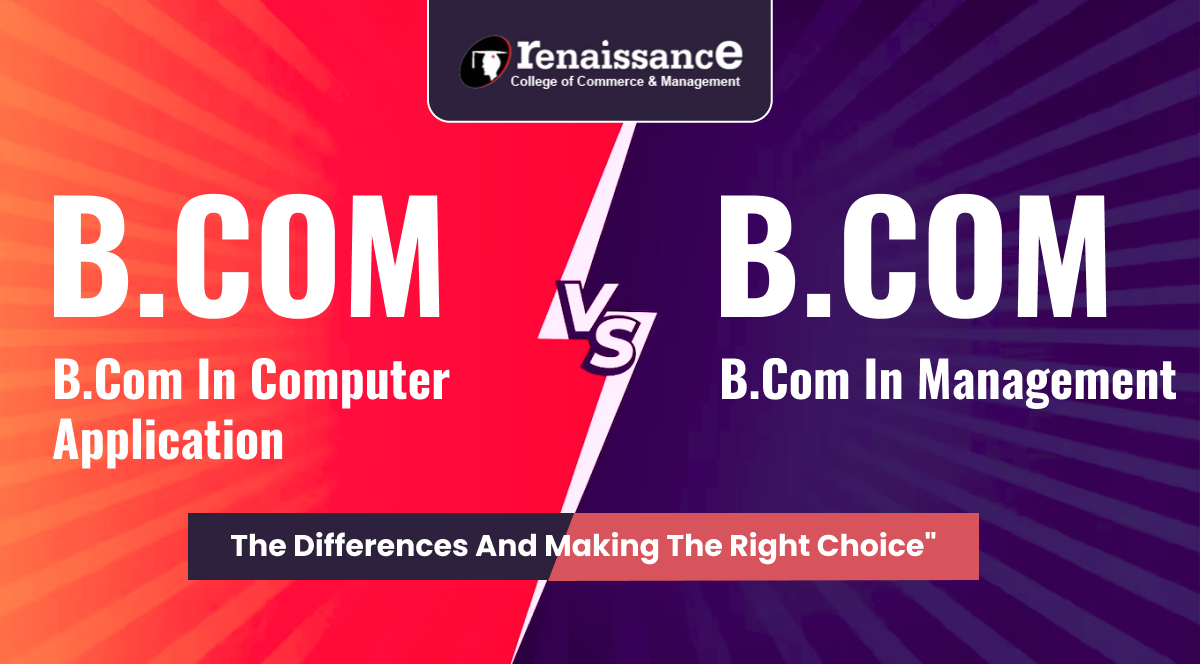Exploring the Differences: B.Com in Computer Application vs B.Com in Management
I. Introduction
In today’s rapidly evolving job market, choosing the right specialization within the Bachelor of Commerce (B.Com) degree program is crucial for a successful career. Two popular specializations within B.Com are Computer Application and Management. Both fields offer unique opportunities and skill sets that cater to different career paths.
In this blog, we will delve into the differences between B.Com in Computer Application and B.Com in Management. We will explore the distinct curriculum, career prospects, and other essential factors that can help you make an informed decision about which specialization aligns best with your interests and goals.
By understanding the contrasting features of these two specializations, you will gain valuable insights into the academic focus, skill requirements, and potential job opportunities associated with each. Whether you have a passion for technology and programming or prefer the intricacies of business management, this blog will provide valuable information to guide your decision-making process.
Join us as we embark on a journey to explore the differences between B.Com in Computer Application and B.Com in Management, equipping you with the knowledge you need to choose the right path for your future career.
B.Com in Computer Application
A. Definition and Scope of B.Com in Computer Application
B.Com in Computer Application is a specialized program that combines the principles of commerce with the practical aspects of computer science. It focuses on equipping students with the knowledge and skills necessary to understand the integration of technology in various business functions.
This degree program encompasses subjects such as programming languages, database management, web development, and software applications. Students learn how to leverage technology to streamline business processes, analyze data, develop software solutions, and enhance overall organizational efficiency.
B. Key Subjects and Coursework
- Programming Languages: Students gain proficiency in programming languages such as Java, C++, Python, and HTML/CSS, enabling them to develop software applications and solutions tailored to business needs.
- Database Management: This subject covers the fundamentals of database design, implementation, and management. Students learn about database systems, SQL queries, data modeling, and data security.
- Web Development: Students acquire skills in creating dynamic and interactive websites using technologies like JavaScript, PHP, and content management systems. They learn about website design, user experience, and e-commerce integration.
- Software Applications: This area focuses on the development and utilization of software applications that support business operations, such as enterprise resource planning (ERP) systems, customer relationship management (CRM) software, and financial management tools.
C. Career Opportunities and Job Prospects
- Software Developer: B.Com graduates in Computer Application can pursue careers as software developers, designing and coding software applications to meet specific business requirements.
- Systems Analyst: With their understanding of both business processes and technology, graduates can work as systems analysts, analyzing organizational needs, identifying technology solutions, and facilitating system integration.
- Database Administrator: Proficiency in database management equips graduates for roles as database administrators, responsible for ensuring data security, integrity, and efficient retrieval.
- IT Consultant: Graduates can provide consultation services to businesses, helping them leverage technology effectively, optimize processes, and enhance productivity.
B.Com in Computer Application offers a unique blend of commerce and technology, opening doors to diverse career opportunities at the intersection of business and IT. The acquired skills in programming, database management, and software applications make graduates valuable assets in today’s digitally-driven business landscape.
B.Com in Management
A. Definition and Scope of B.Com in Management
B.Com in Management is a specialization that focuses on developing foundational knowledge and skills in various aspects of business management. It provides students with a comprehensive understanding of business principles, organizational behavior, marketing strategies, and financial management.
This degree program prepares students to navigate the dynamic business landscape by equipping them with the necessary skills to analyze market trends, make informed decisions, and effectively manage resources within an organization.
B. Key Subjects and Coursework
- Principles of Management: This subject covers the fundamental principles and theories of management, including planning, organizing, leading, and controlling. Students learn about organizational structures, leadership styles, and strategic management.
- Organizational Behavior: This area explores the dynamics of human behavior within organizations. Students gain insights into topics such as motivation, team dynamics, communication, and conflict resolution.
- Marketing: Students learn about marketing strategies, market research, consumer behavior, and product development. They acquire skills in creating marketing campaigns, understanding target markets, and analyzing market trends.
- Financial Management: This subject focuses on financial analysis, budgeting, investment decisions, and financial planning. Students learn how to interpret financial statements, assess risk, and make sound financial decisions.
C. Career Opportunities and Job Prospects
- Business Analyst: Graduates can pursue careers as business analysts, analyzing market trends, conducting market research, and providing insights to support strategic decision-making within organizations.
- Marketing Manager: With their knowledge of marketing principles, graduates can work as marketing managers, overseeing marketing campaigns, developing pricing strategies, and managing brand positioning.
- Human Resources Manager: Graduates can enter the field of human resources, managing recruitment processes, employee development programs, performance evaluations, and ensuring compliance with labor laws.
- Financial Analyst: The understanding of financial management equips graduates for roles as financial analysts, assessing investment opportunities, analyzing financial data, and providing recommendations for optimal financial performance.
B.Com in Management provides a strong foundation in various aspects of business, empowering graduates with the skills to thrive in managerial roles. The acquired knowledge in management principles, marketing strategies, and financial management prepares graduates for diverse career opportunities in different sectors of the business world.
Differences between B.Com in Computer Application and B.Com in Management
When considering a specialization within the Bachelor of Commerce (B.Com) degree program, it is essential to understand the contrasting features of B.Com in Computer Application and B.Com in Management. Here are some key differences between these two specializations:
A. Curriculum Variations:
- B.Com in Computer Application: The curriculum of B.Com in Computer Application focuses on subjects related to programming languages, database management, web development, and software applications. Students gain the technical skills and knowledge necessary to develop software solutions and leverage technology in business processes.
- B.Com in Management: The curriculum of B.Com in Management covers subjects such as principles of management, organizational behavior, marketing, and financial management. It provides a broader understanding of various aspects of business management, emphasizing skills in decision-making, leadership, and strategic planning.
B. Technical Skills vs. Managerial Skills:
- B.Com in Computer Application: This specialization emphasizes the acquisition of technical skills, including programming languages, software development, and database management. Graduates are equipped with the ability to design and develop software applications, analyze data, and utilize technology in business contexts.
- B.Com in Management: In contrast, B.Com in Management emphasizes the development of managerial skills. Students learn about organizational behavior, strategic management, marketing strategies, and financial analysis. The focus is on developing leadership abilities, critical thinking, and problem-solving skills within a business context.
C. Industry Focus and Job Roles:
- B.Com in Computer Application: Graduates of B.Com in Computer Application typically find opportunities in the IT industry, software development firms, and technology-driven organizations. They can work as software developers, systems analysts, database administrators, or IT consultants, utilizing their technical expertise to enhance business operations.
- B.Com in Management: Graduates of B.Com in Management have a broader range of industry options. They can find employment in various sectors such as finance, marketing, human resources, and consulting. Potential job roles include business analysts, marketing managers, human resources managers, or financial analysts, where they contribute to strategic decision-making and managing organizational resources.
D. Salary and Career Growth Prospects:
- B.Com in Computer Application: Due to the specialized technical skills acquired in this field, B.Com in Computer Application graduates often have competitive salary prospects. With the demand for software developers and IT professionals, there are opportunities for career growth in areas such as software engineering, project management, and systems analysis.
- B.Com in Management: Salary prospects for B.Com in Management graduates vary depending on the industry and job role. However, managerial positions often offer the potential for career growth and advancement, with opportunities to move into higher-level management roles or specialize in specific areas such as marketing management or financial management.
Understanding these differences can help you align your interests, skills, and career goals with the appropriate specialization within the B.Com program. Consider your strengths, preferences, and future aspirations to make an informed decision that best suits your individual path.
Factors to Consider When Choosing Between B.Com in Computer Application and B.Com in Management
Choosing between B.Com in Computer Application and B.Com in Management requires careful consideration of various factors. Here are key aspects to ponder when making your decision:
A. Personal Interests and Aptitude:
- Reflect on your passion and aptitude for technology and programming versus business management and leadership.
- Consider the subjects and skills that genuinely resonate with you and align with your long-term career aspirations.
B. Long-Term Career Goals:
- Determine your desired career path and the industries you wish to work in.
- Research the job market and growth prospects for each specialization to ensure alignment with your career aspirations.
C. Market Demand and Future Trends:
- Assess the current and projected market demand for professionals in computer application and management.
- Consider the evolving trends in technology, business, and industry to identify which specialization is likely to offer better long-term prospects.
D. Opportunities for Specialization and Further Education:
- Evaluate the potential for specialization within each field.
- Determine if you have an inclination to pursue advanced degrees or certifications in a specific area, such as data science or finance, which may favor one specialization over the other.
E. Industry Exposure and Networking:
- Consider the exposure and networking opportunities offered by each specialization.
- Research internships, industry connections, and alumni networks to determine which specialization can provide valuable industry exposure and connections.
F. Skill Development and Transferable Skills:
- Analyze the skills acquired in each specialization and assess their relevance and transferability to other domains.
- Identify which skill set is more aligned with your desired career trajectory and can offer versatility and adaptability in a changing job market.
G. Individual Learning Preferences:
- Reflect on your preferred learning style and the teaching methodologies employed in each specialization.
- Consider whether you thrive in a more technical and hands-on learning environment or prefer a broader theoretical and conceptual approach.
By carefully weighing these factors, you can make an informed decision that aligns with your interests, goals, and future prospects. Remember to seek guidance from academic advisors, professionals in the field, and individuals with experience in the desired specializations to gain valuable insights.
Conclusion
In conclusion, the decision between pursuing a B.Com in Computer Application or B.Com in Management is an important one that can shape your future career path. By exploring the differences between these two specializations, considering various factors, and aligning them with your interests and goals, you can make an informed choice.
B.Com in Computer Application equips you with technical skills in programming, software development, and database management. It opens doors to careers in software development, systems analysis, and IT consulting, catering to the growing demand for technology professionals.
On the other hand, B.Com in Management offers a broader understanding of business principles, organizational behavior, marketing strategies, and financial management. It prepares you for managerial roles across diverse industries, including marketing, human resources, and finance, providing opportunities for career growth and leadership positions.
Factors such as personal interests, long-term career goals, market demand, opportunities for specialization, and individual learning preferences should be carefully considered when making your decision. Reflect on your passion, aptitude, and future aspirations to select the specialization that aligns best with your strengths and ambitions.
Remember, this decision is not set in stone, and you can always pursue further education or gain additional skills to complement your chosen specialization. Seek guidance from academic advisors, professionals, and individuals with experience in your desired fields to gain valuable insights and make an informed choice.
Ultimately, by selecting the specialization that resonates with you, aligns with your career goals, and offers growth opportunities, you set yourself on a path toward a rewarding and fulfilling professional journey. Embrace the journey and make the most of the opportunities that come your way.
Frequently Asked Questions (FAQs)
- What is the difference between B.Com in Computer Application and B.Com in Management?
B.Com in Computer Application focuses on the integration of technology in business processes, emphasizing programming languages, software development, and database management. B.Com in Management, on the other hand, provides a broader understanding of business principles, marketing strategies, and financial management, focusing on developing managerial skills for various business roles.
- What career opportunities are available after completing B.Com in Computer Application?
Graduates of B.Com in Computer Application can pursue careers as software developers, systems analysts, database administrators, or IT consultants. They can work in the IT industry, software development firms, or technology-driven organizations.
- What career opportunities are available after completing B.Com in Management?
Graduates of B.Com in Management have a range of career opportunities across different sectors. They can work as business analysts, marketing managers, human resources managers, or financial analysts, depending on their area of interest and specialization.
- Can I switch from B.Com in Computer Application to B.Com in Management or vice versa?
Switching between specializations within the B.Com program may be possible, but it depends on the policies and requirements of the educational institution. It is advisable to consult with academic advisors or department representatives to explore the feasibility of switching and understand any additional requirements or considerations.




